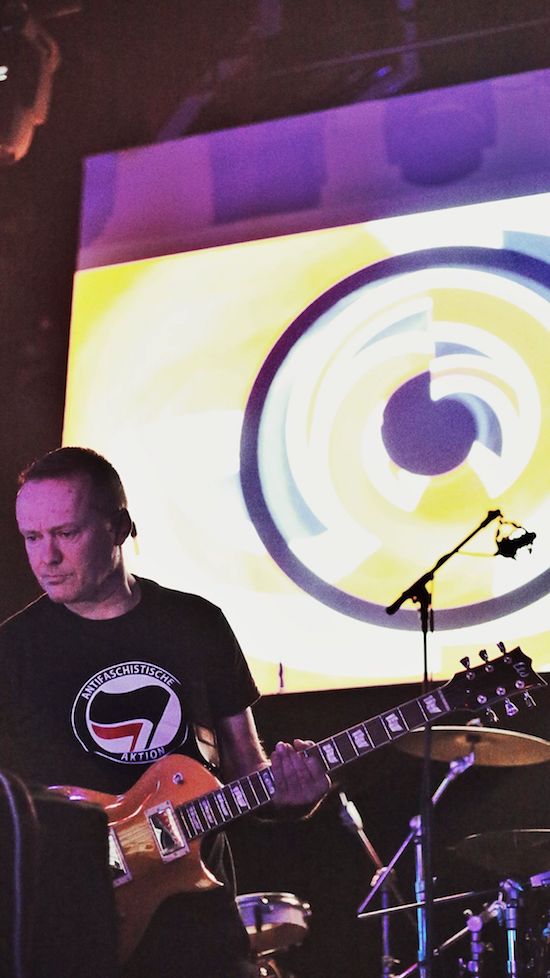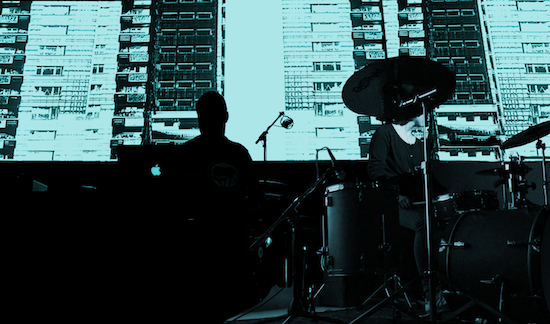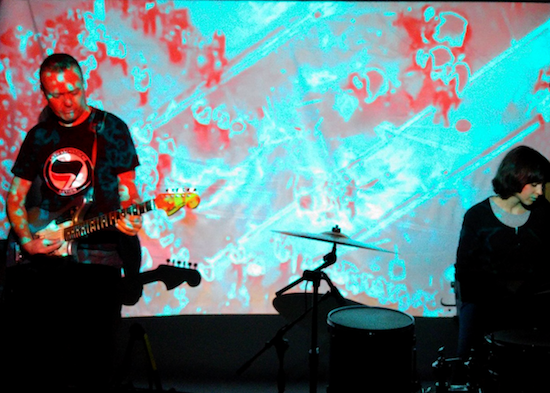All live photographs by Sergio Albert
Pariahs on the periphery of the music scene, feared by the BBC and misunderstood by their peers, Bourbonese Qualk started life in Liverpool in 1979. After relocating to London, they set up squat at The Ambulance Station on the Old Kent Road. From their base in the pit of Maggie’s belly they spewed forth a consistent stream of self-released material on their Recluse label throughout the 80s and 90s, loyal to their DIY ethos to a near detrimental degree.
To new listeners their earlier albums recall the best of many 80s post punk and industrial bands, from early Swans to Durutti Column, or the mind of Crass at war with the questing of Throbbing Gristle, but upon further listening, as the sheer breadth of their aural adventures unfold, comparisons become redundant. There are adventures into ethno-forgery, jazz experimentation, funk and EBM, as political rally cries of the opposition demand the listener to “keep pushing” and “let it go”. Simple self-help at its best.
In 2003, after the death of band member Miles Miles, the band came to a halt, leaving Simon Crab, the group’s core member, to carry on the mission alone. After releasing on album as part of Suneastar in 2007, in 2015, Crab released his first solo record, After America, and thus proved the self-taught multi-instrumentalist could turn his hand to pretty much anything musical successfully. Simon is a member of the London Gamelan Orchestra and a fan of algorithmic music synthesis. He presents us with the soundtrack of his universe in full glory on this album, carrying on where Bourbonese Qualk left off with their final album, 2003’s On Uncertainty
After America is your first formal release since Sunseastar’s debut Fjærlandan in 2007. How have you found the transition from collaboration into working solo?
Simon Crab: Sunseastar was a one off, collaborating with Andy (Wilson), so I was just putting a beat to it, but I think there’s a big difference from being in a band and working by yourself which I don’t really like I must say. What I find difficult about it is that you don’t have that filtering process, whereas if you’re in a band you have a critical thing going on all the time. If you’re just working by yourself you have to trust your own judgement which is not always the best thing. So yeah, I do miss that for sure. I think it’s very hard to get perspective on what you’re doing, I do work with other people but they’re in a much more minor role and they’re not there to criticise.
Bourbonese Qualk seemed to push strong political ideas, do you still feel that there is a political impetus behind your music?
SC: I do. In the old days it was never an overt message that said do this or do that, you always had to interpret it. The lyrics and vocals were always very ambiguous, so I think it’s very important especially these days, to show where you stand, because there is so much growth of the right wing and the growth of this neo folk martial fascist music that’s around needs to be met head on.
You’ve refused to relinquish control over your creative output throughout your career. In the age of social media led music careers, do you feel it has become easier to retain independence?
SC: This is a thing I’ve been thinking and talking with other people about, the effect of social media on culture and music. I started one of the first digital companies in Britain in 93, and that was inspired by this idea that the internet was going to be a vector for social revolution. There was this phrase that it would be “the biggest social revolution since the Gutenberg Bible” and that’s how it seemed, this many-to-many sharing would break down the cartels of broadcasting and the one-to-one paradigm that had existed for so long. But that didn’t really happen.
What you would expect with music is that once you are free from the shackles of production and record labels, that the inherent audience are at your disposal and you can get in touch with them at any time of day. You’d expect that to absolutely revolutionise music but actually, the opposite has happened. What happened is, I think it’s as relevant with politics as it is with music, I think it’s reinforced the genericisation of music, so people who are into Country and Western group together more and develop less, so it becomes more homogenous and less progressive. I think you see that across all different kinds of genres. They separate from themselves and there’s less cross fertilisation. If we had the choice now, would we pull the switch on the internet? Is it a force for good or bad? It’s hard to say, because it’s been such a manipulative thing and it’s caused such a political polarisation, but then conversely you could say the Arab Spring, the crisis in Indonesia and so on, are in this modified global censorship, and crackdowns occur because everyone knows they’re being watched all the time. So, there’s a positive side to it as well.
You put the Bourbonese Qualk archive up online, everything you released for free. Do you feel like you’d somehow be wronging fans and listeners if you had put it up there for a hefty price?
SC: Well ideally everything should be free, and I’m trying to get close to that. It was never intended to be a career or a money-making exercise in the first place, and I’m not sure what the economic longevity of a music product is. To me it is mostly an archive and in that way, it should be accessible to everyone and I don’t think it makes that much difference. Unless you are a mainstream pop musician you’re not going to make that much money out of it. So, either you’re eternally frustrated about not being able to make money out of it, or you try to use the mechanisms that we have to distribute the music as best we can. I was more interested in people hearing it than making money out of it, because we wouldn’t have made that much money!

You incorporated totalitarian motifs in the aesthetic of the band since at least Preparing For Power. It wasn’t until 1988 that you ventured into the Eastern Bloc, including a date in Prague a year prior to the Velvet Revolution, what led to your invitation there?
SC: The Preparing For Power title was actually a critique, no one will ever know this as it was a while ago. It was the name of a Socialist Workers Party, or was it the Revolutionary Communist Party that had a yearly gathering called Preparing For Power? Our critique was that it shouldn’t be about power, what we should be doing is destroying power. It’s about cooperation.
Someone had written to me from Yugoslavia and sent me these tapes that were really interesting, so I got in touch with them and planned to release a compilation album of Eastern European underground bands. I gradually built up a network of contacts in Czechoslovakia, Hungary and Yugoslavia. For various reasons that album didn’t happen, but the contacts then suggested that we come over. At the time people didn’t really know what was going on across the wall, it was just not thought about. There was a gap and that gap was filled with Cold War propaganda. I became obsessively interested in finding out what was going on. It must have been in about 88, that was the first little tour that we did and the way it worked was that we went in on a tourist visa in an unmarked van. At the time I had a 50-seater coach and we used it to smuggle all the equipment in beneath the bus compartments. I think we had a 48-hour tourist visa, we went in for a couple of days and came out again and then went back in with another tourist visa because you just couldn’t get a performance visa and the concerts were all illegal and could have been shut down at any point.
In fact, we did one, it was actually the night of the revolution in Prague and I think everyone knew something was going to go on but no one really knew what was going to happen. This would be 89 I guess. We were playing in the suburbs and we were just about to start and someone comes in and says, look you’ve got to get out of here the cops are coming, leave all your equipment here and get in the bus and just drive as fast as you can. All our money was basically in our equipment and they were assuring us it was fine and while we were having this discussion the cops showed up with the military police and armoured cars and stuff, so we bail onto our bus and the entire audience has got onto our bus, because they want to escape as well. So, there’s like 200 people in a 50-seater bus. We were driving in darkness through Prague trying to escape these armoured cars. I think one of them fell into a ditch and blocked the road and we managed to escape. The next day I wake up and it’s all over you know, the revolution has happened, the government’s resigned and that was it. So, we diverted an amount of the police and military away from the actual action that was happening in Wenceslas Square.
I am guessing you don’t play as many squat gigs now, at least not in Britain. I have personally found that playing abroad offers a better reception than playing in Britain. Do you find playing abroad more of a worthwhile experience?
SC: We do still play squat gigs but not in England, not yet anyway. This is a massive generalisation, but I think that anything that’s kind of experimental or new, it’s very commodified, maybe you could play in Cafe Oto or something in Dalston and play to hipsters that sort of thing, but it doesn’t really exist outside of that and its quite hard to play in a normal venue. The attitude to musicians here or bands is pretty bad, you have to pay to play. I’m not against the idea of playing in England or Britain but we do get a better reception abroad. I think it might be to do with that less polarised commodification of music and just the enthusiasm. A lot of European countries are a lot less commercial than we are here in the UK, at least in London you’re bombarded with commercial stuff all the time so I think there is less of a segmentation in that way.
Do you think there was a cut-off point when squats lost those interesting experimental musical ideas?
SC: Well that’s why people squatted in the first place, for some people it’s just about housing, getting a place to live, for some people it’s a place to have parties and take drugs, and for some people it’s more of a social cultural experiment and I think they tend to be in the minority. In general squatters were quite a wide range of people, they were pretty much the same as the general population, so you get a similar sort of musical attitude as well. I don’t know if you can equate the radicalism of squatting to the radicalism of cultural views. It would be nice to think that they followed, but I don’t think that they do. We always came across this as a problem, which is that the vast majority of people involved in squatting venues just wanted to have parties all the time, whereas our agenda was more long term, setting up a stable organisation and promoting radical culture. We had a lot of problems with that in our day, the music of choice would have been punk or reggae which was not necessarily radical by then, it was already very old actually.
When we did The Ambulance Station we put on at least three or four bands a night, four nights a week and maybe three of those bands would have been something interesting. Or we would organise a specific festival or event for more radical stuff. I put on Jesus and Mary Chain, the first ever thing they did, I put on Pulp loads of times, all quite well-known bands now, that’s how it was.

As you are aware the squat laws changed quite recently in the UK, it’s a lot harder for people to actively squat now that only commercial or industrial places can be squatted as opposed to residential properties. How do you feel you would navigate this climate of squatting if you were a young politically driven artist?
SC: There’s been a huge shift in political goals since we were squatting in the 80s and 90s, when I first moved to London all the buildings were empty. I’m talking hundreds of thousands of empty buildings. It was like a playground for people to take over these buildings and do whatever they wanted, but there was that kind of attitude to do stuff. Obviously, you’d get kicked out by the cops every now and then but it wasn’t too usual. Now people have to work to pay rent and are trying to catch up all the time, so they don’t actually have time to commit themselves to running a thing like that. I think in general people are much more atomised. It’s very hard to get a collective together, even if they did have the time to do it, so I think neo liberal politics has successfully atomised people in a way to stop them getting together to do things like that, and I think that if you do try and do things like that you’re going to have to do it through some kind of supervised managed structure, which obviously destroys it from right at the beginning.
Your reputation at the BBC as a destructive anarchist group meant that the peel session that you were invited to do was constrained by their refusal to let you use their equipment, insisting instead that you use your own, what had you done to earn such a bad reputation?
SC: It was more to do with John Peel’s producer, John Walters. He really took against us for some reason. I don’t really know why, maybe it’s the Liverpool thing, maybe it was the anarcho-squat thing, they never really qualified it.
Do you regret the saboteur nature of your behaviour in the music industry and any detrimental impact that may have had on your success?
SC: No not at all! We could have done more, there was a period in 86/87 when we got a lot of coverage in the music press, so they used to have music agents coming around from record labels. We didn’t have any phones so they were knocking on the door and we told them to bugger off! We had no interest in that and I think that was probably a wise move because it wouldn’t have lasted ten minutes, they would have kicked us out anyway! I think they assumed they might have been able to coerce us into making commercial pop music, and the other thing is they had no idea what we were, they just saw stuff in the press and their boss told them to go around and find out about us and sign us up without having a clue about what we were doing. The funny thing is, we actually did a lot better financially than a lot of the bands we knew who were signed to big labels, they just got ripped off by the big labels, going into recording studios without realising it was going on the bill, whereas we recorded all our stuff ourselves, bought all the equipment, organised the tours, bought tour buses.
I read about the thwarted attempt to spike old Maggie Thatcher with LSD at a Tory party conference. For the sake of a sympathetic readership, could you expand on that?
SC: I’m not sure there’s a lot more to add, but they didn’t get me! They drank the bottle so I left pretty swiftly afterwards and didn’t see the aftermath. It was a big bottle, at least 20 glasses of fairly strong acid. I went to another a couple of years later, they had an annual party there, me and my friend went around drinking Bloody Marys laced with speed, we got into a right state! Towards the end of the night we were pushing Tories up against the walls and I was cutting their ties off with scissors and collecting them all. At the end of the night I had this great big wad of Tory ties and there were all these posh guys going, “Err you can’t do that, you can’t do that!"
Are you able to tell us of any more kind of planned releases on the horizon?
SC: There’s a new album coming out which is done, I’ve just got to work out how I’m going to get it released. It’s provisionally called Demand Full Automation. I’ll probably release this by myself on vinyl in the next few months.
On the November 4, Simon Crab will headline The Monastery of Sound, at The White Hotel in Salford. The lineup also features Errant Monks, English Heretic and Woven Skull. Mannequin Records will reissue a number of old Bourbonese Qualk records on vinyl in the future, while Praxis will reissue their Autonomia LP soon also


